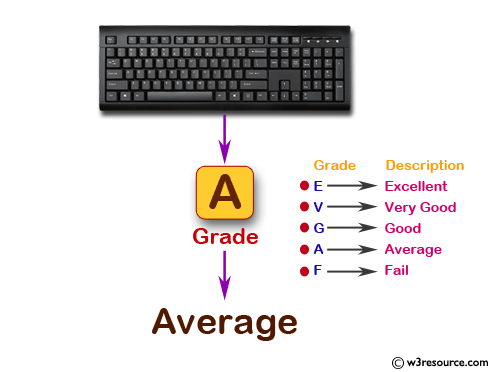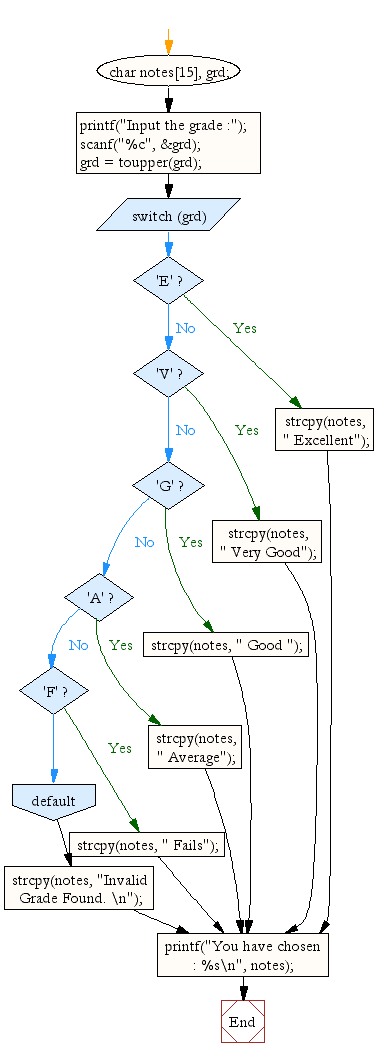C Exercises: Accept a grade and display equivalent description
C Conditional Statement: Exercise-20 with Solution
Write a program in C to accept a grade and display the equivalent description:
| Grade | Description |
|---|---|
| E | Excellent |
| V | Very Good |
| G | Good |
| A | Average |
| F | Fail |
Pictorial Presentation:

Sample Solution:
C Code:
#include <stdio.h>
#include <ctype.h>
#include <string.h>
void main()
{
char notes[15];
char grd;
printf("Input the grade :");
scanf("%c", &grd);
grd = toupper(grd);
switch(grd)
{
case 'E':
strcpy(notes, " Excellent");
break;
case 'V':
strcpy(notes, " Very Good");
break;
case 'G':
strcpy(notes, " Good ");
break;
case 'A':
strcpy(notes, " Average");
break;
case 'F':
strcpy(notes, " Fails");
break;
default :
strcpy(notes, "Invalid Grade Found. \n");
break;
}
printf("You have chosen : %s\n", notes);
}
Sample Output:
Input the grade :A You have chosen : Average
Flowchart:

C Programming Code Editor:
Improve this sample solution and post your code through Disqus.
Previous: Write a program in C to calculate and print the Electricity bill of a given customer.
Next: Write a program in C to read any day number in integer and display day name in the word.
What is the difficulty level of this exercise?
Test your Programming skills with w3resource's quiz.
C Programming: Tips of the Day
Static variable inside of a function in C
The scope of variable is where the variable name can be seen. Here, x is visible only inside function foo().
The lifetime of a variable is the period over which it exists. If x were defined without the keyword static, the lifetime would be from the entry into foo() to the return from foo(); so it would be re-initialized to 5 on every call.
The keyword static acts to extend the lifetime of a variable to the lifetime of the programme; e.g. initialization occurs once and once only and then the variable retains its value - whatever it has come to be - over all future calls to foo().
Ref : https://bit.ly/3fOq7XP
- New Content published on w3resource:
- HTML-CSS Practical: Exercises, Practice, Solution
- Java Regular Expression: Exercises, Practice, Solution
- Scala Programming Exercises, Practice, Solution
- Python Itertools exercises
- Python Numpy exercises
- Python GeoPy Package exercises
- Python Pandas exercises
- Python nltk exercises
- Python BeautifulSoup exercises
- Form Template
- Composer - PHP Package Manager
- PHPUnit - PHP Testing
- Laravel - PHP Framework
- Angular - JavaScript Framework
- Vue - JavaScript Framework
- Jest - JavaScript Testing Framework
